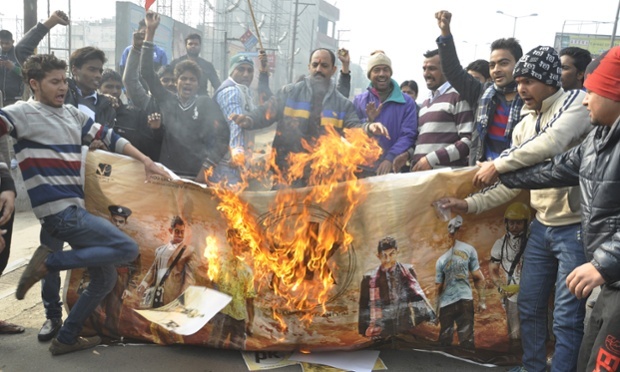
India
Despite the famously secular constitution of the world’s largest democracy, concerns about Hindu nationalism and inter-religious tension have risen under the premiership of Narendra Modi. Playing into this threat, “blasphemy” laws exist and are being increasingly used and cited.
Section 295 of the Indian Penal Code criminalises insult to religion; it allows up to three years imprisonment and fines for “whoever, with deliberate and malicious intention of outraging the religious feelings of any class of citizens of India, by words, either spoken or written, or by signs or by visible representations or otherwise, insults or attempts to insult the religion or the religious beliefs of a class.”
In addition, in 2011 the Indian Ministry of Communications and Information Technology issued new rules requiring operators of social media networks to screen and remove blasphemous content within 36 hours of receiving a complaint.

Some film critics respond to the Bollywood hit, “PK”
In January 2015, the well-received and record-breaking-ly high-grossing Bollywood film PK satirised problems with religion through the eyes of an alien in human form. It was criticised by Hindu nationalists who disliked its satire on “godmen” and called for a ban on the film and a the arrest of its star Aamir Khan and the filmmakers.
Director and writer Rajkumar Hirani responded by explaining, “In fact, with PK, I am saying that we are humans first and not Hindus or Muslims. Everyone should have the freedom to live and get settled with whoever they want to”.
In April 2012, the Catholic Church filed a complaint under Section 295 of the country’s penal code against Sanal Edamaruku, president of the Indian Rationalist Association. Edamaruku had reportedly exposed a supposed “miracle” by revealing that a weeping Jesus on the cross was actually the result of a leaky drain. The local police requested Edamaruku turn himself in and face the charges. He now lives in exile in Finland.
On August 20, 2013, leading anti-superstition campaigner Narendra Dabholkar was shot and killed by two men on a motorbike. The murder came just days after the state government pledged to re-introduce an anti-superstition bill, aimed at making it an offence to exploit or defraud people with ‘magical’ rituals, charms and cures. This bill was closely associated with Dabholkar’s work, and was opposed by many right-wing and Hindu nationalist groups who labelled it “anti-Hindu”.